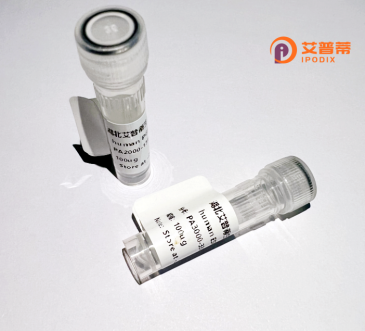
| 纯度 | >90%SDS-PAGE. |
| 种属 | Human |
| 靶点 | USP16 |
| Uniprot No | Q9Y5T5 |
| 内毒素 | < 0.01EU/μg |
| 表达宿主 | E.coli |
| 表达区间 | 1-822 aa |
| 活性数据 | MGKKRTKGKTVPIDDSSETLEPVCRHIRKGLEQGNLKKALVNVEWNICQDCKTDNKVKDKAEEETEEKPSVWLCLKCGHQGCGRNSQEQHALKHYLTPRSEPHCLVLSLDNWSVWCYVCDNEVQYCSSNQLGQVVDYVRKHASITTPKPEKDNGNIELENKKLEKESKNEQEREKKENMAKENPPMNSPCQITVKGLSNLGNTCFFNAVMQNLSQTPVLRELLKEVKMSGTIVKIEPPDLALTEPLEINLEPPGPLTLAMSQFLNEMQETKKGVVTPKELFSQVCKKAVRFKGYQQQDSQELLRYLLDGMRAEEHQRVSKGILKAFGNSTEKLDEELKNKVKDYEKKKSMPSFVDRIFGGELTSMIMCDQCRTVSLVHESFLDLSLPVLDDQSGKKSVNDKNLKKTVEDEDQDSEEEKDNDSYIKERSDIPSGTSKHLQKKAKKQAKKQAKNQRRQQKIQGKVLHLNDICTIDHPEDSDNEAEMSLQGEVNIKSNHISQEGVMHKEYCVNQKDLNGQAKMIESVTDNQKSTEEVDMKNINMDNDLEVLTSSPTRNLNGAYLTEGSNGEVDISNGFKNLNLNAALHPDEINIEILNDSHTPGTKVYEVVNEDPETAFCTLANREVFNTDECSIQHCLYQFTRNEKLRDANKLLCEVCTRRQCNGPKANIKGERKHVYTNAKKQMLISLAPPVLTLHLKRFQQAGFNLRKVNKHIKFPEILDLAPFCTLKCKNVAEENTRVLYSLYGVVEHSGTMRSGHYTAYAKARTANSHLSNLVLHGDIPQDFEMESKGQWFHISDTHVQAVPTTKVLNSQAYLLFYERIL |
| 分子量 | 119.8 kDa |
| 蛋白标签 | GST-tag at N-terminal |
| 缓冲液 | PBS, pH7.4, containing 0.01% SKL, 1mM DTT, 5% Trehalose and Proclin300. |
| 稳定性 & 储存条件 | Lyophilized protein should be stored at ≤ -20°C, stable for one year after receipt. Reconstituted protein solution can be stored at 2-8°C for 2-7 days. Aliquots of reconstituted samples are stable at ≤ -20°C for 3 months. |
| 复溶 | Always centrifuge tubes before opening.Do not mix by vortex or pipetting. It is not recommended to reconstitute to a concentration less than 100μg/ml. Dissolve the lyophilized protein in distilled water. Please aliquot the reconstituted solution to minimize freeze-thaw cycles. |
以下是3篇关于重组人USP16蛋白的研究文献摘要(基于公开数据整理):
---
1. **文献名称**:**"USP16 modulates substrate ubiquitination and regulates DNA damage response"**
**作者**:Zhang et al. (2022)
**摘要**:该研究通过重组表达人USP16蛋白(E. coli系统),证实其去泛素化酶活性对DNA损伤修复的调控作用。实验表明USP16通过去泛素化H2A-K15位点,影响ATM信号通路激活。
---
2. **文献名称**:**"Structural insights into the catalytic mechanism of USP16 deubiquitinase"**
**作者**:Wang et al. (2020)
**摘要**:作者利用昆虫杆状病毒系统表达重组人USP16蛋白,解析其晶体结构,揭示了催化结构域关键残基(Cys205/His414)对水解泛素链的分子机制,为靶向USP16的药物开发提供依据。
---
3. **文献名称**:**"USP16 controls stem cell properties via modulating Bmi1 stability"**
**作者**:Li et al. (2018)
**摘要**:研究通过体外纯化的重组USP16蛋白进行泛素化-去泛素化分析,证明其通过调控Bmi1蛋白稳定性影响干细胞自我更新能力,为癌症干细胞靶向治疗提供新方向。
---
如需具体文献链接或补充信息,请说明研究方向(如结构、功能或疾病关联),可进一步推荐资源!
USP16 (Ubiquitin-Specific Protease 16) is a deubiquitinating enzyme belonging to the ubiquitin-specific protease family, which regulates protein stability and function by removing ubiquitin moieties from target substrates. It plays critical roles in cell cycle progression, chromatin remodeling, and stem cell maintenance. USP16 is notably involved in the deubiquitination of histone H2A at lysine 119 (H2AK119ub), a key epigenetic modification associated with transcriptional repression and DNA damage response. This activity links USP16 to the regulation of gene expression, X-chromosome inactivation, and genomic stability.
Recombinant human USP16 protein is typically produced using heterologous expression systems (e.g., E. coli or mammalian cells) to enable functional studies. Its purified form allows researchers to investigate enzymatic kinetics, substrate specificity, and interactions with regulatory partners. Dysregulation of USP16 has been implicated in cancers, neurodegenerative disorders, and developmental defects, with studies highlighting its dual roles as an oncogene or tumor suppressor depending on cellular context. Recent work also suggests USP16 modulates cellular senescence and aging processes, making it a potential therapeutic target. Structural analyses of recombinant USP16 have identified catalytic domains and binding interfaces, supporting drug discovery efforts aimed at developing selective inhibitors or activators. Its versatile functions underscore its importance in both basic research and translational medicine.
×